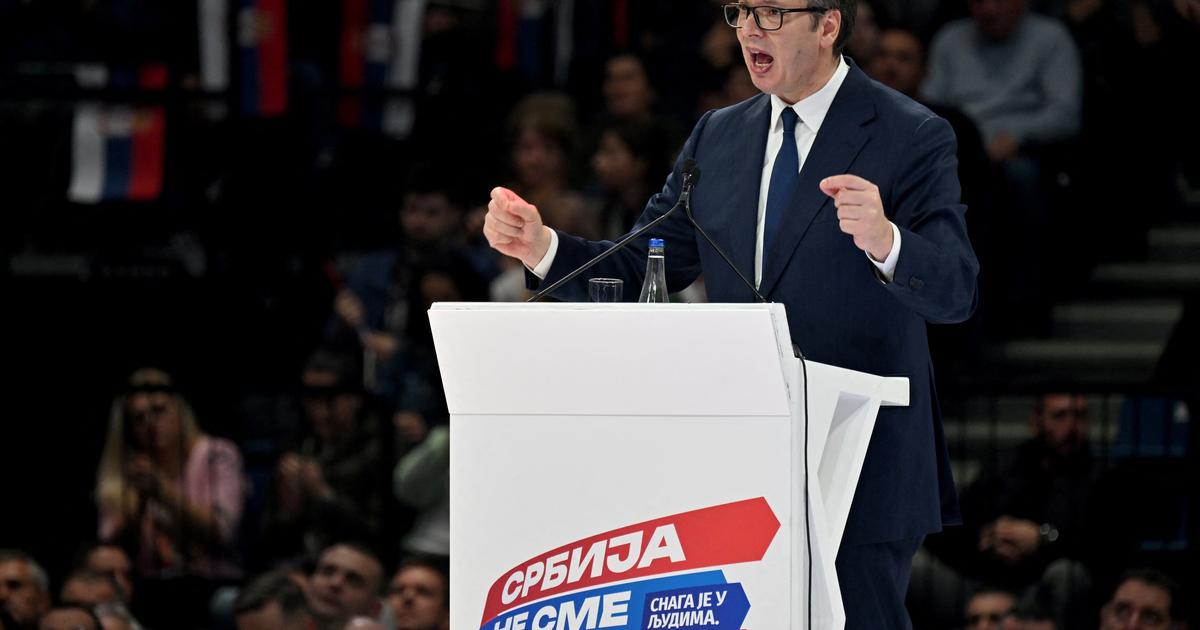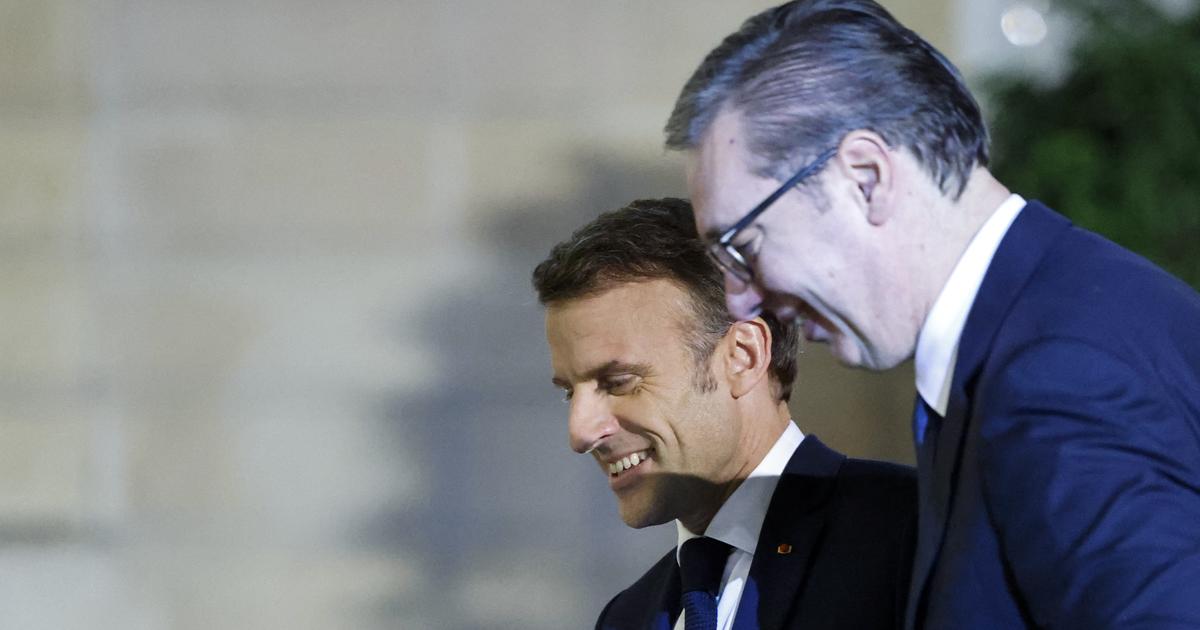Putin's Balkan strategy exposed: After violent Kosovo incident - Moscow "absolutely supports Serbia"
Created: 2022-08-02 14:26
By: Patrick Mayer
The conflict between Serbia and Kosovo is coming to a head.
While the EU wants to de-escalate, Russia continues to stoke the crisis.
A Balkan expert warns of a war.
Munich/Mitrovica/Belgrade - He is striving for a "Serbian world" in the Western Balkans, writes the
taz
in a commentary on Aleksandar Vucic.
Other political observers say he wants to destabilize Bosnia-Herzegovina with the help of the Republic of Srpska and Milorad Dodic.
Dodic is the Serbian-born representative in the Bosnian presidency and openly harbors secession ideas for one of the two republics.
It is not the only source of conflict.
Serbia-Kosovo conflict in the Western Balkans: Russia sides with Belgrade
The fact that Kosovo first gained independence from Serbia in 1999 and Montenegro in 2006 is said not to please today's Serbian President Vucic at all.
The 52-year-old is considered a close confidant of Russian President Vladimir Putin.
The latest example of their solidarity is the current border incident in fragile Kosovo, where allegedly militant Serbs blocked access roads with construction machinery on Sunday (July 31).
And where there are even said to have been shots at Albanian-Kosovar police officers.
Russia once again assured friendly Serbia its support.
"We absolutely support Serbia," said Kremlin spokesman Dmitry Peskov, according to the
Interfax agency
in Moscow: "We support Belgrade's peaceful and constructive position in this regard." the Kremlin spokesman as "absolutely unjustified demands" from the Kosovar side.
Although the Serbian side demands the same from Albanian Kosovars.
We absolutely support Serbia.
Kremlin spokesman Dmitry Peskov
Serbia-Kosovo conflict: dispute in the Western Balkans escalates - international KFOR troops on the ground
After the militant incidents, the Kosovar government in Pristina, after talks with “our US partners”, postponed the new regulations, which were supposed to come into force on Monday (August 1st), (for the time being) by a month to the beginning of September.
Among other things, the regulations stipulated that Serbian identity documents would no longer be recognized at border crossings.
Serbs entering the country would then have had to carry a temporary identification document with them - for the duration of their stay.
The reaction to this was not just barricades.
Shots are also said to have been fired in the direction of Kosovan police officers.
Trouble in Kosovo: Italian carabinieri from the international KFOR police secure a symbolically important bridge over the Ibar in Mitrovica.
© IMAGO/Valdrin Xhemaj/PIXSELL
also read
Putin's 'lie' exposed: This is how Russia's economy really is
Because of Putin: the President of Poland raises the most serious allegations against ex-Chancellor Merkel - "I was stunned"
The peacekeeping force KFOR, which has been stationed in the small country with around 1.8 million inhabitants since the end of the Kosovo war in the summer of 1999, then increased its presence in particularly sensitive areas.
For example, Italian KFOR police officers from the Carabinieri patrolled the bridge over the Irba River in the divided city of Mitrovica.
Currently, 40 states of the NATO-led peacekeeping mission have stationed a little less than 4,000 soldiers and police officers in the small Western Balkan country.
Among them are around 70 German Bundeswehr soldiers.
However, the European Union (EU) offered to mediate.
Kosovo in the Western Balkans: Albanian majority, Serbian influence
Kosovo in the Western Balkans | |
official languages: | Albanian and Serbian |
Capital city: | Pristina |
Total residents: | approx. 1.8 million |
Percentage of Kosovar Albanians: | estimated 88 to 92 percent |
Percentage of Serbs: | estimated 5 to 7 percent |
Residents of Pristina: | estimated 145,000 |
Sources: Military History Research Office (MGFA) of the Bundeswehr, OSCE; Note: These are estimates that have not been updated for years.
In this heated situation, Moscow once again appears as the supposed patron saint of Belgrade.
After the Russian attack on Ukraine, there were expressions of sympathy for Kremlin boss Putin in Serbia, which has around seven million inhabitants.
The Serbian government does not support the international sanctions against Russia and emphasizes its neutrality.
Russia and Serbia: Moscow has stood by Belgrade since 1914 - until today
The close relationships go deep into history.
In the First Balkan War in 1912, Serbia won its independence from the then Ottoman Empire (today's Turkey).
A looming Russian invasion across the Caucasus caused Ottoman hesitation, contributing to defeats by Serbia, Bulgaria, Greece and Montenegro.
And when Austria-Hungary finally declared war on the Kingdom of Serbia on July 28, 1914, a few days later Russia entered the First World War on the side of Belgrade.
"Kosovo is Serbia" is written on a mural in Belgrade, which also shows Russian President Vladimir Putin.
© Darko Vojinovic/AP/dpa
Serbia and Russia: Belgrade and Moscow do not recognize Kosovo - CDU politician warns
Even today, the situation in the Western Balkans is tense.
German CDU politician Michael Brand recently warned in the daily
taz
that the Republika Srpska-Serbia-Russia axis is "a war-capable axis".
He demanded: "The peace must be secured militarily by NATO (...) if we want to effectively prevent the next war in Europe." Political scientist Brand is considered an expert on the Western Balkans.
From 1995 to 2000, the member of the Bundestag worked at the European Balkan Institute in Bonn, and from 1997 to 1998 he studied abroad in Sarajevo, which was badly hit by the Bosnian War (1992 to 1995).
In the meantime, Kosovo split off in 1999 after Serbian troops invaded and bombardments by NATO forces on Belgrade and other Serbian cities, a controversial issue under international law.
Pristina did not declare independence until 2008.
The USA, Germany and other EU countries have recognized this independence ever since.
Serbia and Russia don't do that.
Instead, the Kremlin is fueling resentment again.
(pm)













